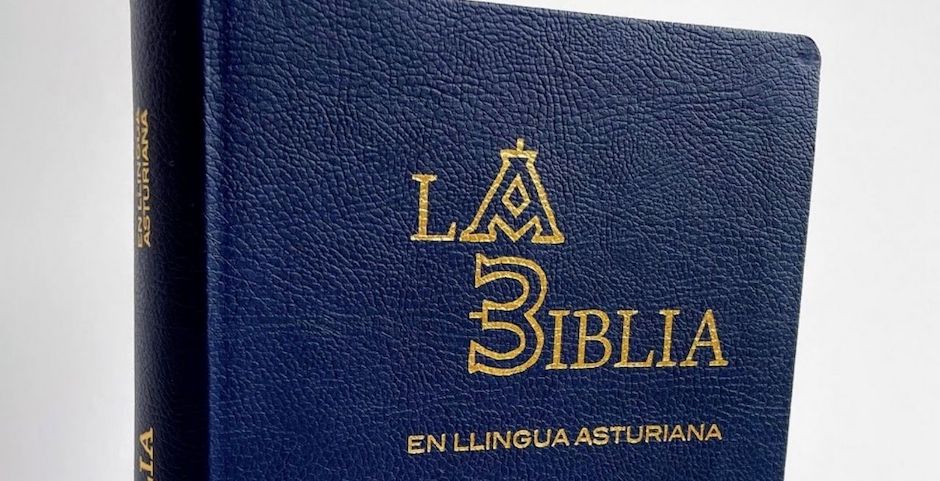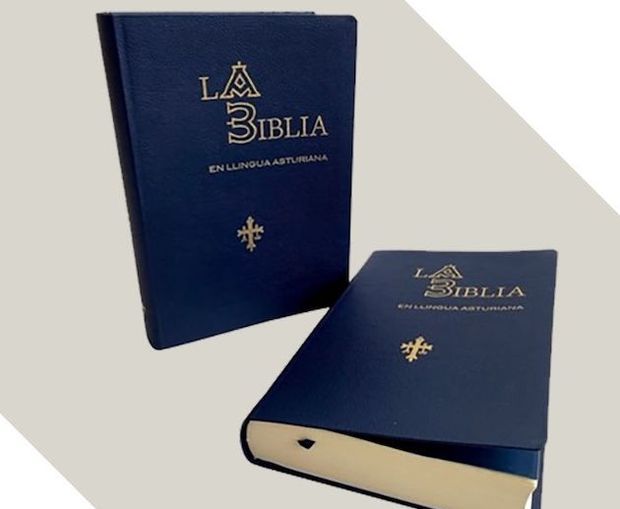After more than three decades of work, the Bible in this language spoken by around 200,000 people in the north of Spain is a reality. “We want it to be the reference text in both the ecclesiastical and civil spheres”.
 Cover of the Bible in Asturian language. / Spanish Bible Society.
Cover of the Bible in Asturian language. / Spanish Bible Society.
The first translation of the Bible into Asturian language was published last March and it was presented this Wednesday at the Royal Institute of Asturian Studies (RIDEA).
The event had a limited in person audience due to restrictions, and was broadcast on the Spanish Bible Society's YouTube channel.
Authorities participated in the presentation of the Bible, including the regional Minister of Culture, Language policy and Tourism, Berta Piñán, who spoke about the cultural significance Asturian version; the former director of the Spanish Bible Society and coordinator of the project, José Luis Andavert; the coordinator of translations of the Bible Society, Ricardo Moraleja; and the consultant and linguistic and literary reviewer of the project, Ramón d'Andrés.
There was also representatives of the evangelical and Catholic communities, which have collaborated throughout the development of the translation and revision of this interdenominational Bible.
Asturian is mainly spoken in the region of Asturias, in the North of Spain, but there are also minorities in the Spanish regions of Leon and Cantabria, as well as in Portugal, who speak the language.
According to the last official state data of 2018, around 200,000 people speak the Asturian language.
According to Ricardo Moraleja, the project has been “arduous” but “gratifying”. “Of all the projects I have had the privilege of working on, perhaps the Bible in Asturian is one of the most complicated”, he told Spanish news website Protestante Digital.
The complications have gone from the lack of economic resources to the loss of people in the work team due to death. Furthermore, “The Asturian language is in a phase of linguistic normalisation”, so that it was difficult “to get translators and linguists to agree”, he added.
“It was also difficult to find people with training in Asturian and Hebrew. We had to teach Hebrew to Asturian linguists, so that they could carry out the translation”, explained Moraleja.

[photo_footer] Cudillero, a town in Asturias. / Miguel Ángel Sanz, CC0 I[/photo_footer] Religious organisations - the Evangelical Council of Asturias and the Archbishopric -, social and educational institutions - the University of Oviedo - and state entities - the Academy of the Asturian Language, the Regional Ministry of Linguistic Policy – have worked hand in hand.
“More than 20 or 30 people from several backgrounds and sensibilities have participated directly: seminaries, universities and secondary school teachers, writers, theologians, pastors have shared their knowledge as reviewers and consultants, creating a work of literary quality and religious sensitivity, with no precedent in Asturias”, stressed Moraleja.
The translation of the Bible in Asturian follows the dynamic equivalence method, which makes the text faithful to the originals and understandable and close to the colloquial use of the language.
“We would like the Bible to become a reference for the good use of the Asturian language. We want it to be the reference text in both the ecclesiastical and civil spheres”, said the coordinator of translations of the Bible Society.
Since the publication of the Bible was announced, and especially since its launch in March, the new Bible has received positive assessment. “Many call it a historic milestone, given the general consideration of the Bible as a religious and cultural monument”, pointed out José Luis Fernández, one of the Asturian evangelicals who has participated in the review of the text.
“I have perceived enthusiastic reactions to having the entire Bible available in Asturian; some pastors have said so. And some churches, such as the Assembly of God in Asturias, have already presented it to their congregations”, added Fernández.
Moraleja agreed that “there is an endearing reaction, not only from believers, but also from people who do not have any kind of faith, but who value having the Bible in their language, as a great legacy and a code of interpretation of Western culture”.

According to Fernández, this translation will be perceived by a large part of Asturian society as “a recognition of its language and culture”, and the “overcoming of the discredit and inferiority with which the Asturian language has been treated by many for a long time, and perhaps it will mean the survival of the language itself”.
Moraleja underlined that “it is important that the Word of God reaches those who have this language as their mother tongue, the language of their heart”, because “to translate the Bible is to preserve culture”.
There is also a spiritual value, which “will depend on the final attitude that Christians, as a church, take towards this new translation, on whether we are able to leave the 'ghetto' where some churches still remain, while avoiding assimilation”, said Fernández.
Mission historian Andrew F. Walls stressed that “new translations, by taking the word of Christ into a new area, and applying it to new situations, have the potential to reshape and expand Christian faith”.
For Fernández “that faith has the potential to avoid the idolatry of cultures and languages, while elevating them to the status of vehicles of divine communication”.
Something that “evangelicals had already done in the Asturian cities of Gijón and Besullo, praying publicly in Asturian language more than one hundred years ago. They, without a Bible in their own language, were already using that language to pray.vMay God help us to continue fulfilling their mission”, concluded the Asturian evangelical.

Las opiniones vertidas por nuestros colaboradores se realizan a nivel personal, pudiendo coincidir o no con la postura de la dirección de Protestante Digital.
Si quieres comentar o